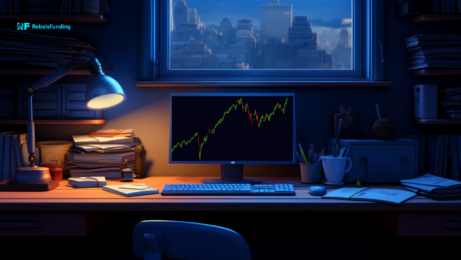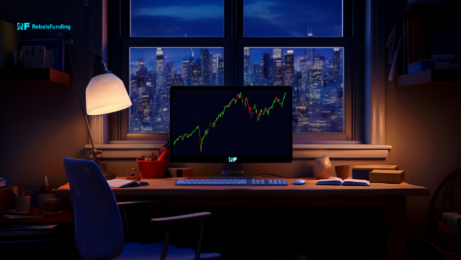10 Common Reasons why Prop Traders Blow their Account & How to Avoid them

The most frustrating experience in prop trading is when we lose our challenge or funded accounts. It feels very painful.
The good news is, we can stop it, we can prevent it. If we care to closely analyze the root of this problem, we can find the cause(s), we can discover actions or habits that often lead to it, we can find a solution.
In today’s blog post, we will share with you some of the approaches, poor habits or attitudes that may result in blowing your account; we will explore ten common reasons why prop traders blow their account and how to avoid them:
1. You have a poor risk management
Risk management is the key to successful prop trading. It helps you limit your losses, protect your capital, and preserve your psychological edge. Without proper risk management, you can easily lose control of your emotions and overexpose yourself to the market.
Some of the essential risk management tools that you should use are stop-loss orders, position sizing, daily drawdown limits, and leverage ratios.
You should monitor your drawdown levels and stay within the predefined boundaries set by a prop firm. You can set your own daily drawdown limit below the predefined limit and work within it.
Risk a tiny percentage, risk what you can lose.
2. You’re overly confident about your skills
Overconfidence is a cognitive bias that makes traders overestimate their abilities, knowledge, and skills, and underestimate the uncertainty and volatility of the market.
Overconfident traders tend to trade too frequently, too aggressively, and too recklessly, ignoring the signals and feedback from the market.
Overconfidence can also lead to confirmation bias, where you only seek and interpret information that supports your existing beliefs and ignore or dismiss information that which contradicts them.
Thus, it is vital to critique your own trade ideas and consider what factors could invalidate them or what you would do if they go against you.
3. You trade without a plan
A trading plan is a document that outlines the trader’s goals, strategies, rules, and performance metrics.
It helps traders to define their edge, identify their opportunities, and execute their trades consistently and objectively.
Trading without a plan is like driving without a map. It leaves you vulnerable to random and impulsive decisions, emotional reactions, and external influences.
4. You chase the market out of desperation
Chasing the market is a common mistake that prop traders make when they try to catch up with a missed opportunity, recover from a loss, or follow the crowd.
It often results in entering or exiting trades at unfavorable prices, increasing the risk and reducing the reward.
It also indicates a lack of discipline and patience (because you abandon your trading plan and act on fear and greed).
Do not chase the market. Stay disciplined.
5. You indulge in revenge trading
Revenge trading is a form of emotional trading where traders try to get back at the market for a previous loss or a series of losses.
It can manifest in various ways, such as increasing the position size, widening the stop-loss, averaging down, or switching to a different market or timeframe.
It can quickly escalate into a vicious cycle of losses. In this situation, you lose your rationality and objectivity, and expose yourself to more risk than you can afford.
You must detach yourself from the outcome of each trade.
6. You don’t adapt to changing market conditions
The market is dynamic and constantly evolving, influenced by various factors such as news, events, trends, cycles, and sentiments.
You need to be flexible and adaptable, and adjust your trading strategies and tactics according to the changing market conditions.
For example, a trend-following strategy may work well in a trending market, but fail miserably in a ranging market.
Similarly, a scalping strategy may work well in a volatile market, but struggle in a calm market.
7. You don’t learn from your mistakes
Mistakes are inevitable in prop trading, as no trader can be right all the time.
However, mistakes can also be valuable learning opportunities, as they can reveal the trader’s strengths and weaknesses, and help them to improve their skills and performance.
Prop traders should not ignore or deny their mistakes, but rather analyze and understand them, and take corrective actions to prevent them from happening again.
8. You don’t record your trades
A trading journal is a record of the trader’s trades, thoughts, emotions, and results. It helps you to track your progress, evaluate your performance, and identify your patterns and tendencies.
A trading journal also helps you to stay accountable, disciplined, and focused, and to learn from your successes and failures.
It is helpful to keep a trading journal, and use it as a tool to enhance your trading edge.
9. You lack a (good) mentor or a coach
A mentor or a coach is someone who has more forex trading experience, knowledge, and skills than you. A person who can guide, advise, and support you in your prop trading journey.
He or she can help you develop a great trading plan, improve your risk management, refine your trading strategies, and most importantly, overcome your psychological challenges.
He or she can also provide you with feedback, insights, and perspectives that you may not be able to obtain on your own.
10. You can also blow your account if you don’t take breaks when necessary
Prop trading can be a stressful and demanding profession, as it requires a high level of mental, emotional, and physical stamina.
You need to take breaks when necessary, take care of yourself and maintain a healthy and balanced lifestyle (in order to perform at your best).
You should exercise regularly, eat well, sleep well, meditate, relax, and have fun (and focus on charts every second).
You should avoid trading when you are tired, sick, angry, or distracted, as these states can impair your judgment and decision-making.
By being aware of these pitfalls, and applying the best practices, you can increase your chances of success and longevity in the prop trading industry.



